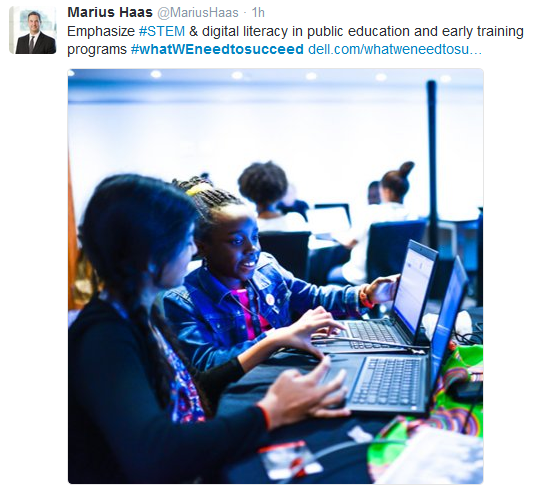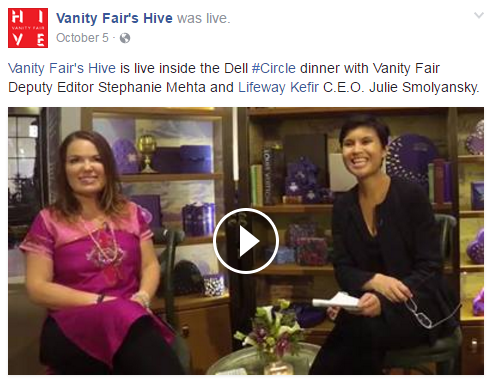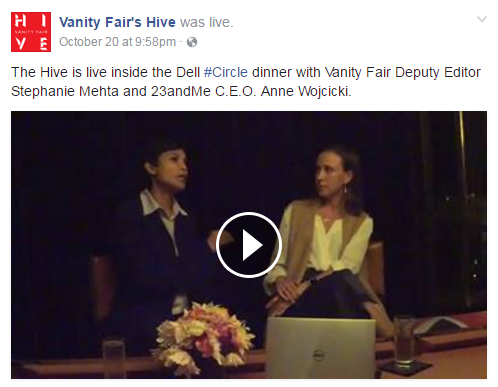How do we build a country of female unicorns?
Unicorns are mystical creatures that make our dreams come true. In Silicon Valley, they are mystical billion dollar valued tech companies that make all their money dreams come true. Unfortunately, only four of them have been created by female founders. This is discouraging for me—why is it that there are so few women owned companies scaling to this level?
Here’s why: Women are only getting 7 percent of venture capital and only 7 percent of stories in the media are about women founders.
But I rather see this as an opportunity than a problem. Why? If women and men participated equally in the entrepreneurial ecosystem, the United States’ GDP could rise by $30 billion. That would be a significant boost for our economy. So how do we accomplish this?
Over the past months Dell, in partnership with Deloitte and Vanity Fair, curated a series of moderated conversations in New York, Chicago and San Francisco with some of the most influential people in our country to put forth a suite of recommendations that can help enhance women’s entrepreneurship in the United States. The suggestions for the necessary elements for success for women entrepreneurs focus on access to capital, expanding and supporting networks and markets, and addressing the changing face of business through technology.
These recommendations were published in an open letter and signed by more than 80 entrepreneurs and business leaders, including Jessica Alba, Alexa von Tobel, Jean Case and Jesse Draper. The letter garnered millions of impressions online through the social media campaign #WhatWeNeedToSucceed and was covered broadly by the media (see: Vanity Fair, New York Magazine and Bizwomen to get a taste).
In each city, the evening started with an interview of Stephanie Mehta, Deputy Editor of Vanity Fair, and a female entrepreneur rock star—Care.com CEO Sheila Marcelo in NYC, Julie Smolyansky, Lifeway Foods, in Chicago, and Anne Wojcicki, 23andme, in San Francisco. Each of them shared with the group of women founders and business leaders how they had overcome challenges along their path of success.
Male V.C.s don’t get women-focused start-ups
In New York City, Sheila Marcelo, founder and CEO of Care.com, shared with how she struggled to raise money for her business. The majority of venture capitalists were and are men, and often times they don’t understand the need for female founded startups, like Care.com.
“I had to explain that they don’t need to be the ultimate customer to understand whether a female company can be a good investment,” she explained in an interview with Vanity Fair Deputy Editor Stephanie Mehta during the dinner.
She won them over by explaining the greater implication of her business—finding good care when you need it—to the economy and community. Now the company is the world’s largest online marketplace for finding and managing family care, with more than 20.7 million members, spanning 18 countries. In 2014, it went public, and 2016 Google Capital became Care.com’s largest shareholder, investing $46.35 million, making this its first investment in a public company.
The struggle remains as “a majority of investors and founders are not aware of any initiatives to increase diversity among founders in their portfolio or their teams,” according to a recent LinkedIn member survey on the state of diversity in venture capital and startups and the strategy toward changing the situation.
She can’t do it
Imagine someone tells you: “There’s no way that a 27-year-old girl can run this company. That’s it. It’s done.” Hard to believe? Well this is exactly what Julie Smolyansky, CEO of Lifeway Foods, had to listen to while grieving her late father, the founder of the company. But instead of being discouraged she ignored the comment and set herself and the company up for greater success. A $250 million one for that matter with international footprint. Julie, together with 15 other female power entrepreneurs, continued the conversation in Chicago about the access to capital, the importance of networking and mentors, and how politicians can better support women in business. See the interview with Stephanie Mehta, Vanity Fair here:
Two guys in a garage…
No, that is not the beginning of a joke. All too often, it is the beginning of a glorious founder story. Anne Wojcicki, founder of 23andMe, is tired of this stereotype—and we are, too. At the last dinner in San Francisco, Anne shared with us how important it is to have more female role models telling their stories. After investing in health care companies for quite some time, she founded the personal genomics company with the mission to revolutionize the access to personal health information. Listen to Anne as she explains how she raised several million dollars and why mentoring is so dear to her heart:
Hearing those great role models, I have no doubt that female entrepreneurs will rise and shine. But we need to collectively work on a better environment for entrepreneurs of all gender, race, age and ethnicity providing equal access to capital, networks and technology. Together we can create the millions of jobs needed to drive not only the US but the global economy. Please join me in raising our voices to make this happen and share #WhatWeNeedToSucceed.




